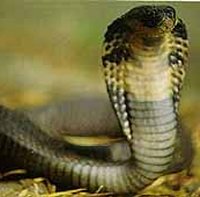They determined that the enzymes in snake poison become activated only when they are injected into the prey. The enzymes then digest the preys meat.
The fact that the snake itself is not affected when the poison enters the venom gland is caused by the acidity in the gland. The enzymes simply do not work in this acidic environment. The hydrochloric acid in the venom gland is produced by similar cells as those found in the stomach. The gland thus shows a great resemblance to the stomach. The acid environment in the venom glad has another advantage, namely that it keeps the venom well for a longer period of time. Besides the low pH-value of the venom gland, snakes also have special protein in their venom that slows down the activity of the poisons enzymes that break down tissue and protein, as long as they are inside the venom gland.
Venomous snakes
28november2006
How come venomous snakes are not bothered by their own poison? Scientists of Northern Colorado University have discovered the underlying mechanism.
